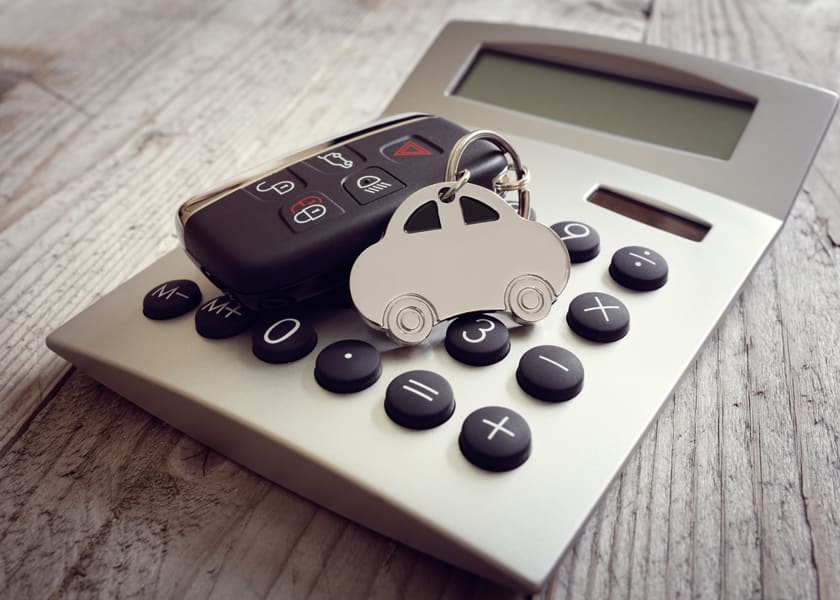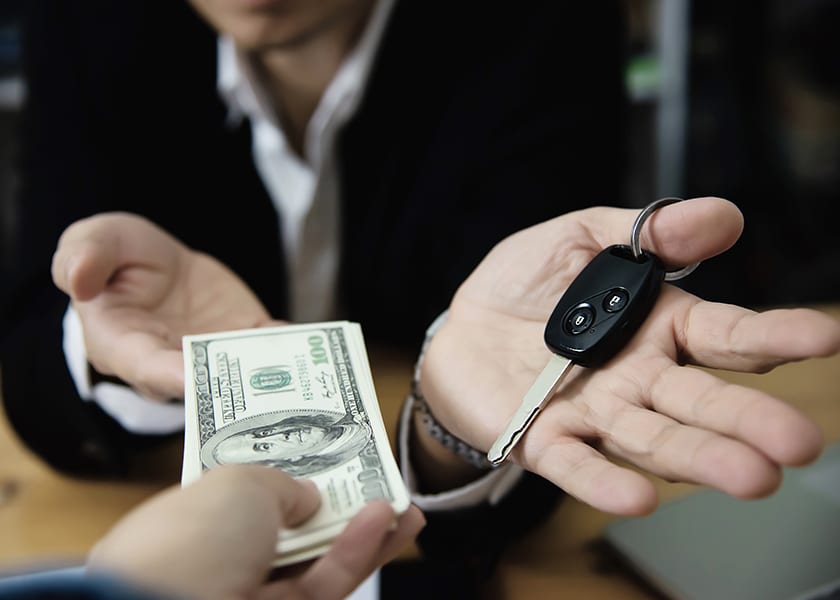Best Car Loan Provider
RateGenius 
Network of Over 150 Lenders
- APR's From 2.99%
- Loans Up To $100,000
- In Business Since 1999
- Average Savings $83/Month
Car Loans Explained
As one of the most significant investments an individual can make in their lifetime, it is important for people desiring a car loan to have at least some knowledge about the process of getting one. This article will list some common terms associated with car loans as well as their definition.
Annual Percentage Rate (APR)
The annual percentage rate refers to the yearly interest rate that has been set by the lender for this particular transaction which includes all fees.
Balloon Payment
A balloon payment is a single, lump-sum payment that is required at the end of the finance term.
Bi-Weekly Payment
Bi-weekly means half as much time which means half as many payments per year. This option allows for larger loan amounts to cover higher-priced cars and reduces the amount of interest paid overtime if the loan is not paid off early. The bi-weekly payment option can either be an upgrade or something included with the car's financing structure and has to be chosen during the initial signing of documents along with other choices such as trade-in options and down payments (if any).
Broker vs Dealer
A broker negotiates with dealerships on behalf of customers looking for a certain make or model of a certain car at a certain price. A dealer is an individual dealership that sells cars they have on their lot.
Closed-End Lease vs Open-End Lease
A closed-end lease requires the leased vehicle to be returned to the dealership at the end of the finance term while an open-end lease does not. If a customer wants to return or trade-in their vehicle, they have no choice but to purchase it themselves, usually at the residual value which is significantly lower than what it was previously sold for initially. An open-end lease can go on indefinitely but sometimes has mileage restrictions and/or charges that are associated with exceeding these set limits. Some car manufacturers offer different types of leases including 48 months instead of 36 months, 5-year options instead of 4-year options, etc.
Down Payment
A down payment is an amount of money that the buyer pays upfront to reduce the total selling price.
Documentation Fee
This particular fee is charged along with other miscellaneous fees by banks and financial institutions to cover the costs of processing documents related to a car loan or lease.
Extended Warranty
An extended warranty is an agreement made between a buyer and seller where if something goes wrong with certain parts/components during the finance term, repairs will be covered at no additional cost except for labor. If there are still problems after this coverage expires (usually around 3 years), then the customer has to pay again for any future repairs or replacements that may arise after the expiration of their initial coverage plan.
File Number
This is the number that a customer receives from their financial institution after they have been approved for a loan or lease. This number can be used as a reference when speaking to the dealership and/or calling the bank.
GAP Insurance
GAP Insurance is an agreement made between a buyer and seller that provides coverage if there are still payments left on a vehicle after it has been totaled in an accident or stolen and not recovered. The payout limit varies depending on what type of car it is but typically costs around $400-$700 per year, including deductibles. If a car is worth less than this amount, then there would be no reason to purchase GAP insurance because it wouldn't cover what was owed at all. However, some insurance policies will cover the difference up to a certain amount if GAP Insurance isn't purchased.
Interest Rate
The interest rate is what your lender charges you to use their money. The APR (annual percentage rate) includes this interest as well as other types of finance charges, such as origination fees, bank fees, etc. When shopping for a loan or lease, it's important that the final APR after all additional fees are added onto the initial quoted rate is lower than what was promised originally so that eventually over time there's no extra cost due to the transaction taking place with a company instead of an individual where they can take advantage of you through various hidden costs and tactics.
Origination Fee
An origination fee is assessed by the lending institution for processing an application, managing the account, etc. This cost covers submitting information online/by phone, setting up automatic payments directly from your bank account if applicable, checking credit reports (if necessary), monthly statements, etc. Depending on the transaction and lender this fee can be waived or might be included in the interest rate instead of being a separate charge.
Processing Fee
A processing fee is charged along with other miscellaneous fees by banks and financial institutions to cover the costs of processing documents related to a car loan or lease. These costs are similar to documentation fees but differ because they only apply if something goes wrong like delayed payment submissions or missing signatures on forms sent out prior to payment is due.
Residual Value
This is the estimated value of a car at the end of its finance term which can be between 36-48 months depending on the product you choose from your lender, assuming that it has been paid off in full and no damage has been done to it over time as well as subject to depreciation as determined by the manufacturer, make, model, year, mileage, etc.. If this amount isn't high enough then it would be necessary to purchase GAP insurance to cover payments if there were an accident or theft involved which affected the actual value of a vehicle since most people won't have enough money saved up after a loss like that. For this reason alone, individuals often prefer buying their own vehicles outright and paying them off in cash instead of leasing or financing them.
Title
A title is a legal document that serves as evidence that an individual has official ownership of a car and the right to sell it to someone else. Most states, if not all, require auto owners to keep their titles in their possession at all times because it's considered proof of who owns the vehicle (the person whose name appears on the front of the page). If you're unable to produce this paperwork when asked by law enforcement, then there have been incidents where police have confiscated vehicles from drivers on the premise that they were obviously driving illegally without registration or any way to prove that they had purchased or leased a vehicle legally. In some cases, people even have their car or truck repossessed if they fall behind on payments.
Title Lien
The title of a vehicle is considered to be in lien when it's being held by someone else who has legally acquired the right to take possession of the vehicle later on, usually after all previous liens have been satisfied which can happen in cases where people are unable to pay off loans or leases unless there's some sort of outside help that comes into play like an inheritance or other large sum of money that wasn't expected at all.
For example, say someone borrows $20,000 from XYZ Bank for a car and ends up only making the minimum monthly payment (assuming this is actually possible) but fails to make any extra payments during the course of 3 years or longer (24 months). At this point, they owe $5,000 in finance charges alone to cover the interest on their loan and nothing towards paying off the balance. After 9 months of neglecting every other payment, it would be possible for XYZ Bank to go after that person's vehicle if necessary. All that would happen is an authorized agent simply requests a copy of the title page from the DMV where they'd need to sign it over before handing it back to them without question.
After receiving this legally backed document then they could sell the car themselves due to having prima facie evidence that John Doe owed them money which was never resolved/satisfied. This way XYZ Bank can get some of their money back after realizing that they weren't going to be receiving anything else from Mr. or Mrs. Doe anytime soon.
Vehicle Identification Number
This is an alpha-numeric code that is present on every vehicle in North America and parts of Asia/Australia which is used to identify the specific car, truck, van, or SUV being referred to when someone says something like "I have a Ford F150 with a VIN number of ABCD1234." This way it's possible for people who are either looking for parts online (for sale) or trying to verify if they're buying the correct thing after possibly getting ripped off by some unscrupulous individual(s). The auto industry uses this system because it has enough characters to be unique without being too long/complicated for the average person to remember.
Lender
A lender is defined as a person or company that provides someone else with money that they expect to be paid back in the future, usually after an agreed-upon period of time. This can either come in the form of a loan where you borrow cash from them without giving anything in return, or by leasing something for a limited amount of time. There are also several other factors at play when it comes to lenders because not everyone considers all types equally even though most people are aware that there are different ways to get money depending on their specific situation(s). For example, say someone loses their job unexpectedly and has no way to support themselves financially unless they take out another bank loan using their house/car/personal property as collateral.
Maturity Date/Term
A maturity date is a specific date where a person or company will have to pay off their debt in full if they haven't done so already. This can happen by either making one final payment before it's completely paid off or by letting the time period elapse which could potentially result in legal action being taken against them by whomever they borrowed money from originally. For example, if someone borrows $10,000 from XYZ Bank at 7% interest per year then they'll have to pay back that exact amount by the maturity date or risk incurring additional charges on top of what they already owe. The time frame between when this loan was taken out and either paid off in full or
Amortization
Amortization is the process of paying off an amount of money over time by dividing it into equally sized portions; usually monthly/annually. For example, say someone takes out a new car loan for $30,000 at 5% interest rate which has to be repaid within 5 years (60 months). Because the monthly payment is fixed at $500/month, that means they'll have to make a total of 60 separate payments before it's completely paid off. By doing this each payment will end up being slightly more than $500 because they're also paying interest on what they owe, thus allowing them to gradually chip away at the principal amount through a series of regular payments. This results in them having to pay much less than the entire original amount since they're paying interest on part of what they owe.
Residual Value
The residual value is the estimated/projected price of a car or other type of vehicle when it's been driven for so many years and so many miles that it's no longer worth anything close to what it originally cost. Whenever a car is driven off the lot by a new owner, its value rapidly decreases as it's driven around and experiences normal wear and tear through everyday usage. This is because it can't be sold for nearly as much as what they paid for it when it was brand-new, even though there will always be a certain number of people who are willing to pay a small fraction of the cost to buy it from them as-is. In some cases, this is because they can't afford something more expensive or don't want to spend as much as other people would require.
Conclusion
Car loans can be a complicated and confusing topic to many people. Luckily, we're here to help you navigate the terminology and provide clear definitions of common car loan terms that most consumers will find useful. For example, if someone has forgotten what amortization is then they may want to keep reading because this article covers all types of information related to auto lending. We hope our list helps make understanding these topics easier for everyone who needs it!














